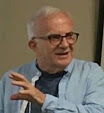This is the first of three meditations I gave at Mayflower Church in Minneapolis on December 11, 2022.
Snow fell all night outside the windows of the small octagonal oratory. The single candle illuminating the room cast an uncertain light on bare wooden walls. I had come to Saint John's Abbey for a solitary retreat. The Director of the Episcopal House of Prayer had welcomed me to this retreat house, but now I was alone. Enfolded within the warmth of this space, deep within the stillness of a Minnesota winter night, I began to cry. Icons of Mary – the Theotokos - emerged from the shadows. In a real and tangible sense, she had come to accompany me in my grief. She was my companion that night.
My
mother died on the same day that Timothy McVeigh drove his truck to the federal
building in Oklahoma City. I remember nothing about the bombing. I remember
every detail of the phone call from my sister. I was born on my mother’s
birthday; for forty-nine years we celebrated our birthdays together. But on
this one, my fiftieth, she was gone.
The sun
shone brightly on the next day. I trudged through deep snow to the Abbey Church
for prayer. The guest master invited me to sit in the choir stalls; other
guests guided me through several books of prayer, scripture and song.
Later in the day, I was drawn to a small alcove in the church. A Twelfth-Century wooden statue of Mary gently balanced her Child on her lap. In that dimly lighted space, she was not just the mother of Jesus. She was the Great Mother. She was not just a nurturing parent but the substance from which the Christ emerges. She was not just the vessel of divinity, but its throne, not just its bearer, but its expression.
My
hand trembled as I placed a votive candle before her. My Methodist mother would
never have understood, but this candle was for her, for us, and for all that
had passed between us down through the years.
Years
later I would lead pilgrimages of Muslims, Jews, and Christians to sacred sites
of our religions. Our Mediterranean journeys always took us through Ephesus, an
ancient center of the sacred feminine stretching back in time to the legendary
Amazons. In Ephesus a modest stone house, known for generations as “Mary’s
House”, is a bustling pilgrimage destination for Muslims and Christians alike.
A
prayer wall stretches along a path leading to the house. Thousands of slivers
of paper and cloth – the earnest petitions of Muslims, Christians, and a few
skeptics as well - are tucked into its crevices. Muslims are praying. Catholics
are celebrating Mass. Evangelicals are electronically amplifying their
contemporary music. Nevertheless, contemplatives manage to find oases of
quietude where they sit, meditate, and pray.
For
believers and non-believers alike, the Annunciation discreetly acknowledges the
mystery of conception. It celebrates the beginning of life and its holiness. Judith
Dupré sees in Gabriel’s Ave Maria, in Mary’s response, and
in Joseph’s commissioning, humanity’s transcendence of the idea of ourselves as
merely mortal.
“Grace,”
said Thomas Aquinas, “renders us like God, and partakers of Divinity.”
©Budd Friend-Jones
December 11, 2022
Mayflower Church
Minneapolis, Minnesota













No comments:
Post a Comment